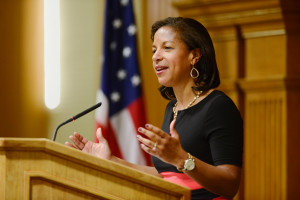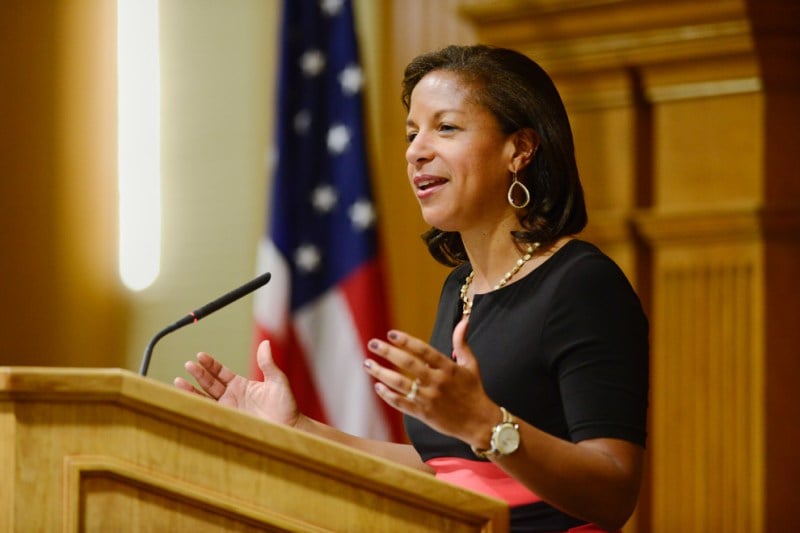
In an event hosted by the Freeman Spogli Institute (FSI) on Monday, National Security Advisor Susan E. Rice ’86 spoke on climate change and its role within national security, anticipating the 2015 United Nations Climate Change Conference being held in Paris starting on Nov. 30.
This was Rice’s second official visit back to campus, the first being when she delivered the Commencement address in 2010 while serving as ambassador to the United Nations. This time, she was welcomed by President John Hennessy and Michael McFaul, Director of the FSI and former ambassador to Russia.
After fondly recounting her personal experience at Stanford, Rice quickly focused on the topic of climate change, remembering that in 1985, during fall quarter of her senior year at Stanford, scientists from around the world had concluded that the buildup of greenhouse gases — particularly carbon dioxide — would result in the greatest rise in global mean temperature in man’s history.
“It’s not that we didn’t see climate change coming,” Rice said. “Instead, for the better part of the three decades, we failed repeatedly to treat this challenge with the seriousness and the urgency it deserves.”
Rice believed that the ideological gap between developing and developed countries on how to cope with climate changes by adjusting paces of economic development compromised the prospects of international cooperation. At the same time, “domestic pressures,” as Rice put it, also hindered the U.S. government from taking timely action. In addition, considerable attention has been devoted to other national security considerations, ranging from terrorism to cyber attacks to the Ebola crisis.
However, “today, we face no greater long-term challenge than climate change,” Rice asserted. “The science is not up for debate. I know you all are not the crowd that needs to be convinced. You’re living it.” She cited Stanford’s redwoods and eucalyptus trees dying from drought as vivid evidence of global warming.
“As for those who remain unconvinced, I respectfully suggest that they’re either not paying attention, or they’re not living on the same planet as the rest of us,” Rice said.
Many prominent Republican leaders, including several candidates for the 2016 presidential election, have openly expressed their doubt on whether global warming is real. For instance, Republican Senator Ted Cruz recently told Time Magazine that “if you look to the satellite data for the last 18 years, there has been zero recorded warming.”
Openly contesting the claim, Rice mentioned that, “in the past 15 years, we’ve had 14 of the hottest years on record, which is exactly the kind of changes climate scientists back in 1985 suggested we would be seeing by now.”
Rice cited extreme weather patterns on both ends of the spectrum. Last year, 2014, was the hottest year on record and many scientists now say there is 95-percent chance a new record will be set this year.
“While we can’t say that climate change is the direct cause of any specific weather event,” said Rice, citing the unprecedented level of rainfall in Carolina last week, “these are exactly the trends that we expect to see more of if climate change continues on the current trajectory.”
Despite the Republican suspicion, however, Rice believed that “we are in fact at an inflection point, a moment where consensus is building.” She mentioned that President Barack Obama has emphasized climate change policy as a defining imperative in both foreign and domestic policies.
“American leadership under President Obama has been crucial to galvanize many countries, particularly the major carbon emitters to move beyond the ideological shackles that had held us back in the past,” Rice said.
Last year, the United States and China, the world’s two largest greenhouse gas emitters, signed a historic act agreeing to work together to ameliorate climate change, signaling the possibility of collaboration between developed and developing countries on environmental protection.
During Chinese President Xi Jinping’s visit last month, the two countries issued a Joint Presidential Statement on Climate Change, in which both parties aimed to “promote sustainable development and the transition to green, low-carbon, and climate-resilient economies” by taking strong domestic actions, including development of clean energy sources and “efforts in Washington,” such as prompting Congress to stop sequestration and passing a budget for the Green Climate Fund. Rice did not specify how bipartisan cooperation might be achieved on these issues.
Rice urged Stanford students to address the global challenge of climate change.
“Thirty years from now, when one of the students sitting in the audience today might have my job,” Rice said. “What would you say to a room full of students with their whole future ahead of them? I hope you’ll be able to tell them when the world finally came together to preserve the one earth we all must share.”
Contact Qitong Cao at qitong ‘at’ stanford.edu.
